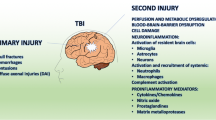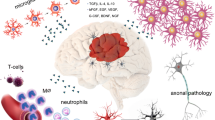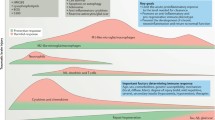Abstract
Traumatic brain injury (TBI) is the major cause of death and severe disability in young adults and infants worldwide and many survivors also have mild to moderate neurological deficits which impair their lives. This review highlights the primary and secondary lesions constituting craniocerebral trauma and the main elements of neuroinflammation, one of the most important secondary events evolving after the initial traumatic insult. Neuroinflammation has dual and opposing roles in outcome after TBI, being both beneficial and harmful, its effects often differing between the acute and more delayed phases after injury. Since each patient with TBI has a unique and complex pattern of cerebral damage, developing pharmacological intervention strategies targeted at the multiple cellular and molecular events in the neuroinflammatory cascade is difficult. While there have been very few successful outcomes to date in human clinical trials of drugs developed to treat TBI in general, those that have been devised to modulate neuroinflammation are discussed.


Similar content being viewed by others
References
Aarabi B, Cook J (2005) Missile wounds of the head. In: Reilly PL, Bullock R (eds) Head injury. Pathophysiology and management. Hodder Arnold, London, pp 384–405
Abou-Hamden A, Blumbergs PC, Scott G et al (1997) Axonal injury in falls. J Neurotrauma 14:699–713
Adams JH (1990) Brain damage in fatal non-missile head injury in man. In: Braakman R (ed) Handbook of clinical neurology, vol 13, issue no 57. Elsevier, Amsterdam, pp 43–63
Adams JH (1992) Head injury. In: Adams JH, Ducken LM (eds) Greenfield’s neuropathology. Edward Arnold, London, pp 106–152
Adams JH, Graham DL, Scott G et al (1980a) Brain damage in non-missile head injury. J Clin Pathol 33:1132–1145
Adams JH, Scott G, Parker LS et al (1980b) The contusion index: a quantitative approach to cerebral contusions in head injury. Neuropath Appl Neurobiol 6:319–324
Adams JH, Doyle D, Ford I et al (1989) Diffuse axonal injury in head injury: definition, diagnosis and grading. Histopathology 15:49–59
Adelson PD (1999) Paediatric brain injuries: prognosis and recovery. In: Marion DW (ed) Traumatic brain injury. Thieme, New York, pp 283–290
Aldrich EF, Eisenberg HM, Saydjari C et al (1992) Diffuse brain swelling in severe head-injured children. A report from the NIH traumatic coma data bank. J Neurosurg 76:450–454
Allan SM, Rothwell NJ (2001) Cytokines and acute neurodegeneration. Nat Rev Neurosci 2:734–744
American Academy of Paediatrics Committee on Child Abuse and Neglect (1993) Shaken baby syndrome: inflicted cerebral trauma. Pediatrics 92:872–875
Anderson R, McLean J (2005) Biomechanics of closed head injury. In: Reilly PL, Bullock R (eds) Head injury. Pathophysiology and management. Hodder Arnold, London, pp 26–40
Anderson V, Yeates KO (2010) Paediatric traumatic brain injury. Cambridge University Press, Cambridge, pp 1–6
Arvin B, Neville LF, Barone FC et al (1996) The role of inflammation and cytokines in brain injury. Neurosci Biobehav Rev 20:445–452
Asensio VC, Campbell IL (1999) Chemokines in the central nervous system: plurifunctional mediators in diverse states. Trends Neurol Sci 22:504–512
Bal-Price A, Brown GC (2001) Inflammatory neurodegeneration mediated by nitric oxide from activated glia—inhibitory neuronal respiration, causing glutamate release and excitotoxicity. J Neurosci 21:6480–6491
Bazan NG, Rodriguez de Torco EB et al (1995) Mediators of injury in neurotrauma: intracellular signal transduction and gene expression. J Neurotrauma 12:791–814
Beauchamp K, Mutlak H, Smith WR et al (2008) Pharmacology of traumatic brain injury: where is the “golden bullet”? Mol Med 14:731–740
Bellander BM, Singhrao SK, Ohlsson M et al (2001) Complement activation in the brain after traumatic head injury. J Neurotrauma 18:1295–1311
Biagas KV, Uhl MV, Schiding JK et al (1992) Assessment of post-traumatic polymorphonuclear leucocyte accumulation in rat brain using myeloperoxidase and vinblastine treatment. J Neurotrauma 9:363–371
Blumbergs PC (2005) Pathology. In: Reilly PL, Bullock R (eds) Head injury. Pathophysiology and management. Hodder Arnold, London, pp 41–72
Blumbergs PC, Jones NR, North JB (1989) Diffuse axonal injury in head trauma. J Neurol Neurosurg Psychiatr 52:838–841
Blumbergs PC, Scott G, Manavis J et al (1994) Staining of amyloid precursor protein to study axonal damage in mild head injury. Lancet 344:1055–1056
Blumbergs PC, Scott G, Manavis J et al (1995) Topography of axonal injury as defined by amyloid precursor protein and the sector scoring method in mild and severe closed head injury. J Neurotrauma 12:565–572
Blumbergs PC, Reilly PL, Vink R (2008) Trauma. In: Louis DN, Love S, Ellison DW (eds) Greenfield’s neuropathology, vol 1, 8th edn. Arnold, London, pp 733–832
Bradbury MWB (1993) The blood–brain barrier. Exp Physiol 78:453–472
Bullock R, Butcher S, McCullough J (1990) Changes in extracellular glutamate concentration after acute subdural haematoma in the rat—evidence for an “excitotoxic” mechanism. Acta Neurochir (Suppl) 57:274–276
Bullock MR, Lyeh BG, Muizelaar JP (1999) Current status of neuroprotection trials for traumatic brain injury: lessons from animal models and clinical studies. Neurosurgery 45:207–217
Cederberg D, Siesjo P (2010) What has inflammation to do with traumatic brain injury? Childs Nerv Syst 26:221–226
Chesnut RM, Marshall LF, Klauber MR et al (1993) The role of secondary brain injury in determining outcome from severe head injury. J Trauma 34:216–222
Clark RSB, Kochanek P (2001) Brain injury. Kluwer Academic, Boston
Conti AC, Raghupathi R, Trojanowski JQ et al (1988) Experimental brain injury induces regionally distinct apoptosis during the acute and delayed post-traumatic period. J Neurosci 18:5663–5672
Degos V, Favrais G, Kaindl AM et al (2010) Inflammation processes in perinatal brain damage. J Neural Trans 117:1009–1017
Denny-Brown D, Russell WR (1941) Experimental cerebral concussion. Brain 64:93–164
Donnelly DJ, Popovich PG (2008) Inflammation and its role in neuroprotection, axonal regeneration and functional recovery after spinal cord injury. Exp Neurol 209:378–388
Duhaime AC, Gennarelli TA, Thibault LE et al (1987) The shaken baby syndrome: a clinical, pathological, and biomechanical study. J Neurosurg 66:409–415
Finnie JW, Blumbergs PC (2002) Traumatic brain injury. Vet Path 39:679–689
Finnie JW, Blumbergs PC, Manavis J et al (2012) Neuropathological changes in a lamb model of non-accidental head injury (the shaken baby syndrome). J Clin Neurosci 19:1159–1164
Gahm C, Holmin S, Mathiesen T (2000) Temporal profiles and cellular sources of 3 nitric oxide synthetase isoforms in the brain after experimental contusion. Neurosurgery 46:169–177
Garden GA, Moller T (2006) Microglia biology in health and disease. J Neuroimmune Pharmacol 1:127–137
Geddes JF, Hackshaw AK, Vowles GH et al (2001) Neuropathology of inflicted head injury in children. I. Pattern of brain damage. Brain 124:1290–1298
Gehrmann J, Matsumoto Y, Kreutzberg GW (1995) Microglia: intrinsic immuneffector cell of the brain. Brain Res Rev 20:269–287
Gennarelli TA, Thibault LE (1985) Biomechanics of head injury. In: Wilkins RH, Rengachary S (eds) Neurosurgery, vol 2. McGraw-Hill, New York, pp 1531–1535
Gennarelli TA, Spelman GW, Langfitt TW et al (1982a) Influence of the type of intracranial lesion on outcome from severe head injury. J Neurosurg 56:26–32
Gennarelli TA, Thibault LE, Adams JH et al (1982b) Diffuse axonal injury and traumatic coma in the primate. Ann Neurol 12:564–574
Graham DL, Lawrence AE, Adams JH et al (1987) Brain damage in non-missile head injury secondary to high intracranial pressure. Neuropath Appl Neurobiol 13:209–217
Graham DL, Ford L, Adams JH et al (1989a) Fatal head injury in children. J Clin Pathol 42:18–22
Graham DL, Ford L, Adams JH et al (1989b) Ischaemic brain damage is still common in fatal non-missile head injury. J Neurol Neuosurg Psychiatr 52:346–350
Graham DI, McIntosh TK, Maxwell WL et al (2000) Recent advances in neurotrauma. J Neuropath Exp Neurol 59:641–651
Guilian D, Chen J, Ingeman JE, George JK et al (1989) The role of mononuclear phagocytes in wound healing after traumatic injury to mammalian brain. J Neurosci 9:4416–4429
Hanisch U-K, Kettenmann H (2007) Microglia: active sensor and versatile effector cells in the normal and pathologic brain. Nature Neurosci 10:1387–1394
Hausmann EH, Berman NE, Wang TT et al (1998) Selective chemokine mRNA expression following brain injury. Brain Res 788:49–59
Hoch RC, Schraufstatter IU, Cochrane CG (1996) In vivo, in vitro and molecular aspects of interleukin-8 and the interleukin-8 receptors. J Lab Clin Med 128:134–145
Holmin S, Mathiesen T (2000) Intracerebral adminstration of interleukin-1β and induction of inflammation, apoptosis and vasogenic oedema. J Neurosurg 92:108–120
Holmin S, Soderlund J, Biberfeld P et al (1998) Intracerebral inflammation after human brain contusion. Neurosurgery 42:291–298
Jaerve A, Muller HW (2012) Chemokines in CNS injury and repair. Cell Tissue Res 349:229–248
Jennett B, Bond M (1975) Assessment of outcome after severe rain damage. Lancet 1:480–484
Jones NR, Blumbergs PC, North JB (1986) Acute subdural haematomas: aetiology, pathology and outcome. Austral NZ J Surg 56:907–913
Juliet PA, Mao X, Del Bigio MR (2008) Pro-inflammatory cytokine production by cultured neonatal rat microglia after exposure to blood products. Brain Res 1210:230–239
Kelley BJ, Lifshitz J, Povlishock JT (2007) Neuroinflammatory responses after experimental diffuse brain injury. J Neuropath Exp Neurol 66:989–1001
Kenne E, Erlandsson A, Lindbom L, Hillered L, Clausen F (2012) Neutrophil depletion reduces oedema formation and tissue loss following traumatic brain injury in mice. J Neuroinflamm 9:17
Kim KS, Wass CA, Cross AS et al (1992) Modulation of blood–brain barrier permeability by tumour necrosis factor and antibodies to tumour necrosis factor in the rat. Lymphokine Cytokine Res 11:293–298
Knoblach SM, Faden AI (1998) Interleukin-10 improves outcome and alters pro-inflammatory cytokine expression after experimental traumatic brain injury. Exp Neurol 153:143–151
Kumar A, Loane DJ (2012) Neuroinflammation after traumatic brain injury: opportunities for therapeutic intervention. Brain Behav Immun 26:1191–1201
Lenzlinger PM, Morganti-Kossmann MC, Laurer HL et al (2001) The duality of the inflammatory response to traumatic brain injury. Mol Neurobiol 24:169–181
Lindenberg R, Freytag E (1960) The mechanism of cerebral contusions. Arch Pathol 69:440–469
Loberg EM, Torvik A (1989) Brain contusions: the time sequence of the histological changes. Med Sci Law 29:109–115
Luerssen TG, Klauber MR, Marshall LF (1988) Outcomes from head injury related to patient’s age: a longitudinal prospective study of adult and paediatric head injury. J Neurosurg 68:409–416
Marshall LE, Gautille T, Klauber MR (1991) The outcome of severe closed head injury. J Neurosurg 75:528–536
Maxwell WL, Povlishok JT, Graham DI (1997) A mechanistic analysis of non-disruptive axonal injury: a review. J Neurotrauma 14:419–440
Mendelow AD, Crawford PJ (2005) Primary and secondary brain injury. In: Reilly PL, Bullock R (eds) Head injury. Pathophysiology and management. Hodder Arnold, London, pp 73–92
Merril JE, Benveniste EN (1996) Cytokines in inflammatory brain lesions. Helpful and harmful. Trends Neurosci 19:331–338
Miller JD, Adams JH (1972) Physiopathology and management of increased intracranial pressure. In: Critchley M, O’Leary J, Jennett B (eds) Scientific foundations of neurology. Heinemann Medical, London, pp 308–324
Morganti-Kossmann MC, Lenzlinger PM, Hans V et al (1997) Production of cytokines following brain injury: beneficial and deleterious for the damaged tissue. Mol Psychiatry 2:133–136
Morganti-Kossmann MC, Rancan M, Otto V et al (2001) Role of cerebral inflammation after traumatic brain injury: a revisited concept. Shock 16:165–177
Morganti-Kossmann MC, Rancan M, Stahel PF et al (2002) Inflammatory response in acute traumatic brain injury: a double-edged sword. Curr Opin Crit Care 8:101–105
Narayan RK, Michel ME, Ansell B et al (2002) Clinical trials in head injury. J Neurotrauma 19:503–557
Norenberg MD, Smith J, Marcillo A (2004) The pathology of human spinal cord injury: defining the problems. J Neurotrauma 21:429–440
Ommaya AK, Gennarelli TA (1974) Cerebral concussion and traumatic unconsciousness. Brain 97:633–654
Povlishock JT (1992) Traumatically induced axonal injury: pathogenesis and pathobiological implications. Brain Pathol 2:1–12
Povlishock JT, Christman CW (1995) The pathobiology of traumatically induced injury in animals and humans: a review of current thoughts. J Neurotrauma 12:555–564
Raghupathi R, Graham DI, McIntosh TK (2000) Apoptosis after traumatic brain injury. J Neurotrauma 17:927–938
Reilly PL, Adams DH, Graham DI, Jennett B (1975) Patients with head injury who talk and die. Lancet 2:375–377
Reinert MM, Bullock R (1999) Clinical trials in head injury. Neurol Res 21:330–338
Rubin LL, Staddon JM (1999) The cell biology of the blood–brain barrier. Ann Rev Neurosci 22:11–28
Scherbel V, Raghupathi R, Nakamura M et al (1999) Differential acute and chronic responses of tumour necrosis factor-deficient mice in experimental brain injury. Proc Natl Acad Sci USA 96:8721–8726
Schmidt OI, Infanger M, Heyde CE, Ertel W, Stahel PF (2004) The role of neuroinflammation in traumatic brain injury. Eur J Trauma 30:135–149
Schwab JM, Seid K, Schluesner HJ (2001) Traumatic brain injury induces prolonged accumulation of cycloxygenase-1 expressing microglia/brain macrophages in rats. J Neurotrauma 18:881–890
Shaw NA (2002) The neurophysiology of concussion. Prog Neuroobiol 67:281–344
Sheriff FE, Bridges LR, Gentleman SM et al (1994) Markers of axonal injury in post-mortem human brains. Acta Neuropathol 88:433–439
Shohami E, Ginis I, Hallenbeck JM (1999) Dual role of tumour necrosis factor-alpha in brain injury. Cytokine Growth Factor Rev 10:119–130
Skaper SD (2011) Ion channels on microglia: therapeutic targets for neuroprotection. CNS Neurol Disord Drug Targ 10:44–56
Soares HD, Hicks RR, Smith DH et al (1995) Inflammatory leucocytic recruitment and diffuse neuronal degeneration are separate pathological processes resulting from traumatic brain injury. J Neurosci 15:8223–8233
Stahel PF, Morganti-Kossmann MC, Kossmann T (1998) The role of the complement system in traumatic brain injury. Brain Res Brain Res Rev 27:243–256
Stoll G, Jander S, Schroeter M (2002) Detrimental and beneficial effects of injury-induced inflammation and cytokine expression in the nervous system. Adv Exp Med Biol 513:87–113
Swartz KR, Liu F, Sewell D (2001) Interleukin-6 promotes post-traumatic healing in the central nervous system. Brain Res 896:86–95
Taoka Y, Okajima K (2000) The role of leucocytes in spinal cord injury in rats. J Neurotrauma 17:219–229
Teasdale G, Jennett B (1974) Assessment of coma and impaired consciousness. A practical scale. Lancet 2:81–84
Ward JD (1996) Paediatric head injury. In: Narayan RK, Wilberger JF, Povlishock JT (eds) Neurotrauma. McGraw-Hill, New York, pp 859–867
Watanabe T, Yamamoto T, Abe Y (1999) Differential activation of microglia after experimental spinal cord injury. J Neurotrauma 16:255–265
Zhang J, Rivest S (2001) Anti-inflammatory effects of prostaglandins E2 in the central nervous system in response to brain injury and circulating lipopolysaccharide. J Neurochem 76:855–864
Ziebell JM, Morganti-Kossmann MC (2010) Involvement of pro- and anti-inflammatory cytokines and chemokines in the pathophysiology of traumatic brain injury. Neurotherapeutics 7:22–30
Zink BJ, Szmydynger-Chodobska J, Chodobski A (2010) Emerging concepts in pathophysiology of traumatic brain injury. Psychiatr Clin N Am 33:741–756
Author information
Authors and Affiliations
Corresponding author
Additional information
Special Issue: Dedicated to the “Life and work of Professor Barrie Vernon-Roberts”.
Rights and permissions
About this article
Cite this article
Finnie, J.W. Neuroinflammation: beneficial and detrimental effects after traumatic brain injury. Inflammopharmacol 21, 309–320 (2013). https://doi.org/10.1007/s10787-012-0164-2
Received:
Accepted:
Published:
Issue Date:
DOI: https://doi.org/10.1007/s10787-012-0164-2




